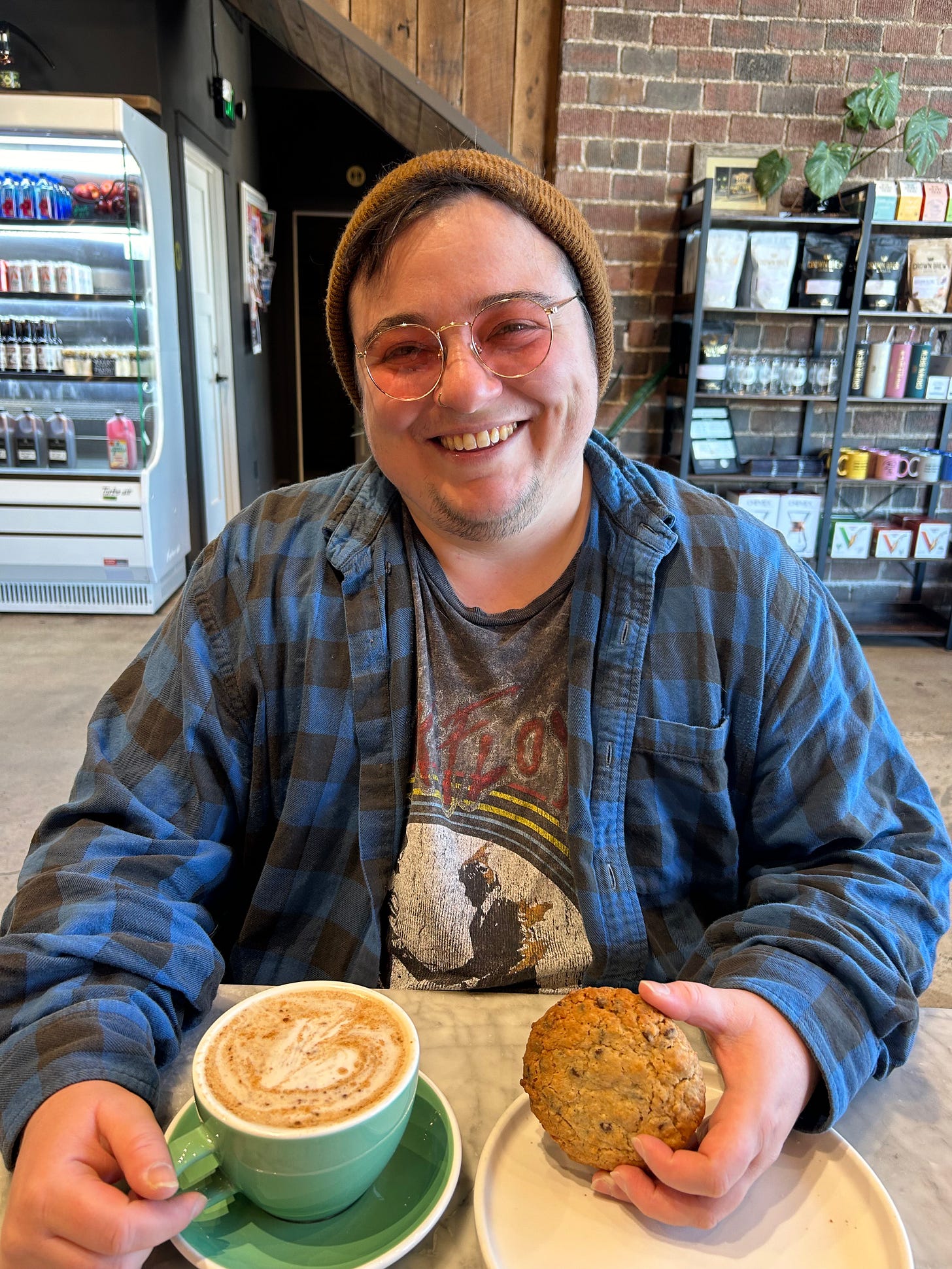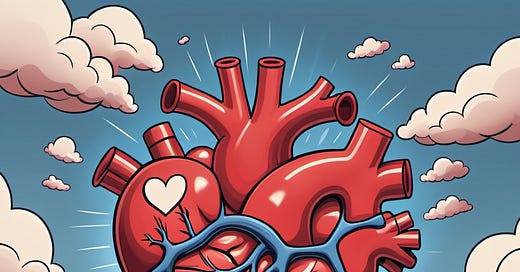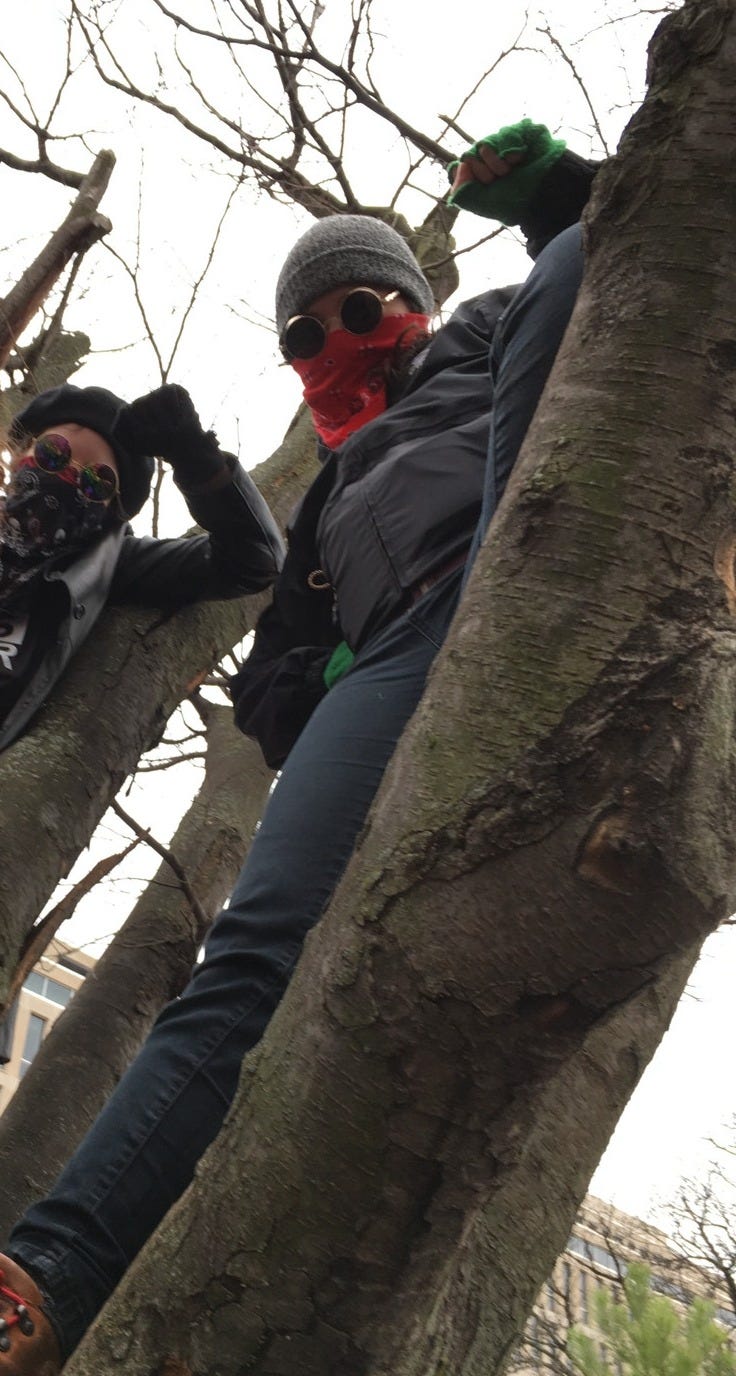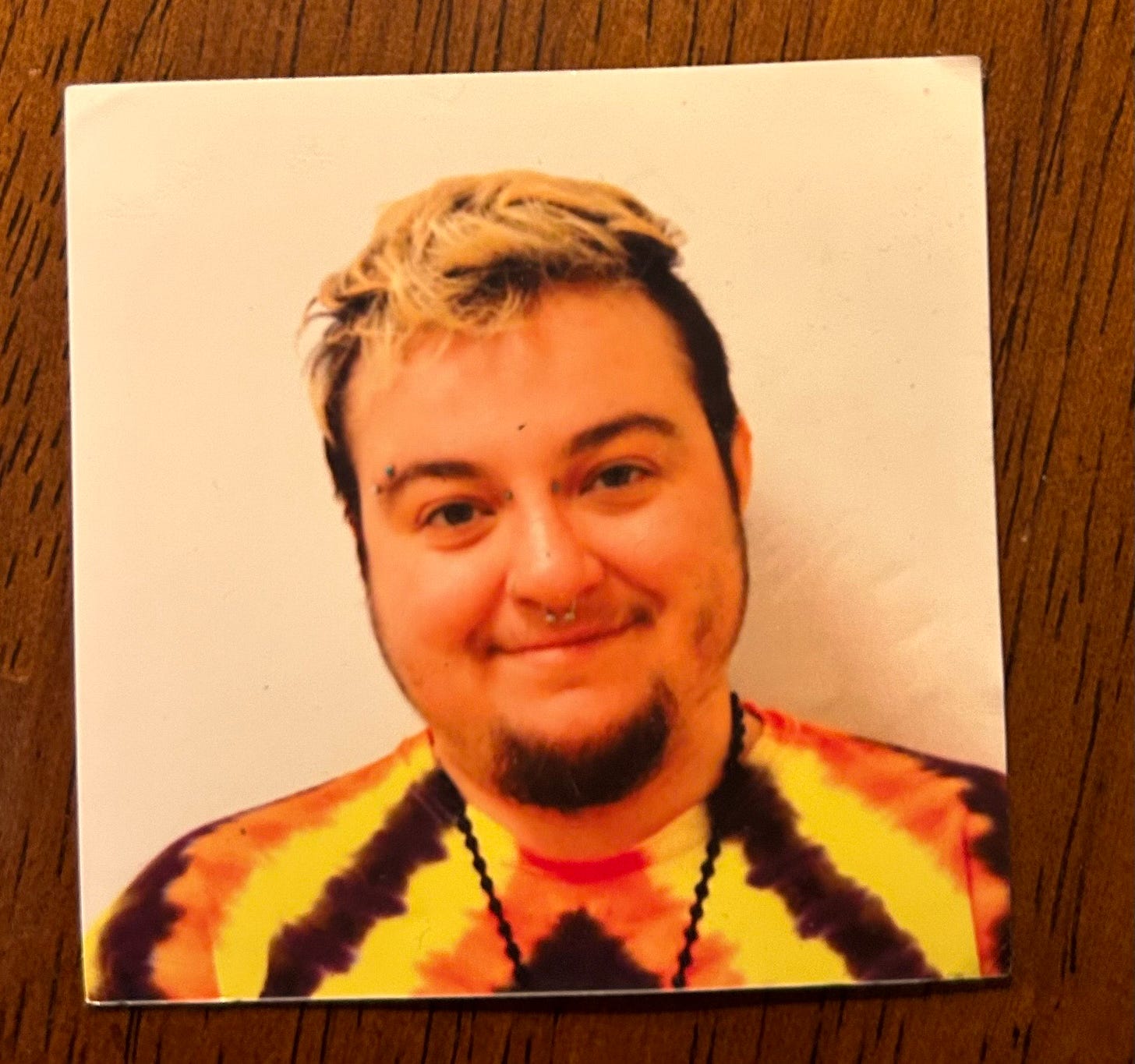Reader, you may be surprised to learn that my wife and I spent yesterday quite peacefully. We continued the consolidation of our home library (a process I call reverse-Benjamining), drank tea, ate pasta, cuddled with the animals. I took a few phone calls, mostly to function as a sounding board for friends who were feeling destabilized. I, a gay gender weirdo, ran errands around various enclaves of Southern Illinois – both those that were celebrating and those that very much weren’t.
Such presence of mind was not mine in November 2016. I was in a doomed-to-fail relationship with a much older tech butch who FaceTimed me (we were in separate cities that night – an apt metaphor for where our relationship was headed). She wore a look of self-serious injured dignity, one that seemed to say To think, after all we’ve fought for! She told me that we had to resist fascism, that our love was resistance. I was 26 years old and my hands were trembling. When we hung up, I felt faint.
I took her words to heart, and what felt like the rest of the world’s as well. I attended every protest I could, waking up early with hundreds of other chilly Chicagoans to march to the base of Trump Tower, shaking and keening all the while. There seemed no limit to the human rights at stake: LGBT rights, immigrant rights, BIPOC rights, women’s rights. I blanched with every new executive order. I was in journalism school at the time, and published as many news stories as I could about the efforts of my comrades-in-resistance. There emerged in my mind’s eye a distinct dichotomy between us and them. With every bizarre news item, every horrifying soundbite, it seemed increasingly clear that we were racing against the clock to save humanity, and that they seemed intent upon laying waste to our species. There was an ideological shibboleth between our camps that could not be breached, at least not upon risk of cancellation.
The eight years that followed that November would contain times that felt existentially impossible, as well as times that were transcendently beautiful and transformative in ways I could never have predicted. And neither Donald Trump nor Joe Biden were personally responsible for any of it.
*
Let me be clear, reader: I don’t intend to argue here that we, either as a country or a world, are unaffected by the decisions of the person who sits in the Oval Office. Executive orders are made, legislation is passed, laws are enforced. Supreme Court justices are appointed, SCOTUS issues a decision, or else finds occasion to overturn one that’s already been issued. Because of our country’s federalism, much decision-making about American civic life falls to the states, so that the material impact of a given law – or, say, a given podcast interview – is frequently determined not just by who one is, but by where and how one lives.
The idea that one can be “insulated” from the deleterious effects of a given presidency by their privilege – the word that became a sneered epithet in the mouths of my comrades-in-arms back in 2016 – is both true and not. Certainly there are those of us with social and economic advantages and those of us without. Yes, the world is a big and many-splendored thing tilting at various times towards catharsis, crisis, or both. On the one hand, there’s all the amazing art humans have created; on the other, there’s climate change. On the one hand, there’s social progress and civil rights; on the other, widespread immiseration and economic exploitation. The flourishing of cities versus the devastation of war; the forging of mutual understanding versus terror-based campaigns of violence; scientific progress versus eugenics. The list goes on.
And in the midst of all this, there’s feeling. Call it affect, zeitgeist, a commonly held system of belief: what I’m referring to is the emotional machinery that’s set in motion when you’re confronted with a certain data set, the gears that begin turning with the initial headline and are greased with every subsequent social media post, comment, text and phone call. Yesterday as in November 2016, there was a pervasive feeling among many of my friends that we the Correct Ones ought to be afraid – afraid unto the point of hopelessness, so afraid that it will be difficult to think straight, let alone go about our daily lives. And while this fear is certainly not a material thing in the same way as, say, a forced sterilization, a prison cell, or a violent skirmish at a protest, it certainly has material effects.
Whether or not you consider yourself shielded by economics or identity, there is no shielding yourself from feeling. It’s in the air and supremely catching, transmitted via convincing rhetoric, in-group dynamics, and outright repetition. In this way, our minds are more easily governed than our bodies. If I want to achieve some kind of authoritarian control over a subject, why would I waste my time and breath attempting to wrangle said subject’s unwilling body when I could just induce their mind to do the wrangling for me?
I say this not from a perch of enlightenment, looking down upon all the poor saps captured by their woeful ideologies. I say this as a person who was once so captured myself – not necessarily by a president, but by a so-called friend who wanted to steal everything he could from me before killing me.
I describe my capture and abuse in some detail in this essay, so I’ll just add here that my abuser was a new friend in town, a card-carrying member of my various woebegotten identity communities: a toothy trans man who also happened to be a career criminal and sociopath. We met in late 2023, during the Biden presidency. He said he’d moved to Illinois seeking safety from anti-trans laws in Texas. We spent four hellacious months attached at the hip, during which I hemorrhaged money and very nearly lost my partner and then my life.
Would you believe me if I told you that my feeling about this friend was that he was perhaps the greatest friend I’d ever had? That I should abandon my own career to ensure that his took off, that I should cut him checks and read his unpublished novels and surrender every single relationship I held dear to be as close to him as possible? That I was nothing – that I was worse than nothing, just some odious middle class nepo baby, a mediocre sad sack whose creative career was made possible by my loathsome privilege? That I was insane and dumb and a hopeless drug addict and only he knew how to take care of me – only he, and not the many people who’d known and loved me for years, could be trusted?
The thing that seems insane to me now is that I could have looked into the eyes of a person who actively hated me – who was planning my own death – and seen a lifelong friend. It reminds me of how I used to think of the “white working class” circa 2016: They’re so duped, they voted for him in droves thinking he has their back but he’d squash them in an instant if it proved remotely useful to him. And it was with this sense of noblesse oblige that I wrote and protested and attempted to foster dialogue all the way up through 2020, harboring an unshakable sense of certainty that my dim view of this out group was the clear-eyed perspective, that I could just make people see the correct side of things if I shouted loud enough.
I wonder how I must have come across to the interlocutors I knew I was so much smarter than? When I snapped at people and labeled them bigots for fumbling my pronouns, or assured bewildered friends of color that I knew I was extremely racist and was doing my best to work through it – what then? When, during a BLM march, I screamed so loud at the snarky counter-protestor than he burst into embarrassed laughter, I wonder who I thought I was deceiving? Though I don’t have to wonder anymore, as I’ve since done the unthinkable for any good, Gaia-fearing leftist: I’ve become close friends with people who don’t share my voting record.
There’s something about being brought to the very brink of sanity and safety that really tends to snap things in perspective. Put another way: when your life and mental wellbeing have been ripped to such shreds that your walls must come down not as a good-natured thought experiment, but as a matter of survival, you learn quite quickly who is willing to be your friend. At various times this past year, I’ve been beset by PTSD-induced panic attacks so intense that I haven’t been able to work, have been riven by a depression unlike any I’ve ever experienced, have plunged back into drug use before finally abandoning it for good. I’ve been hundreds of miles from home and without the money to put gas in the tank, dropped to the floor from sheer anxiety and exhaustion, was browbeaten by an administrator for taking sick leave, puzzled endlessly over how one goes about their life with their entire savings wiped out and credit cards maxed, had to scramble for months to keep the bank account from overdrawing. I even did the unthinkable-for-the-polite-middle-class and asked family and a few close friends for money outright.
Many of the people who’ve come to my rescue have known me for decades, have been in lockstep with me politically: a highly generous Venmo here, series of smaller donations there, lengthy phone calls of encouragement. And there were those I’ve only known for a handful of years but who nevertheless share an avowed worldview, who helped my wife and I move houses and search for our lost dog Blossom, who gifted us their incredible talents – acupuncture, massage therapy – to ease us through a heinously stressful time.
And then there were those friends who don’t share my voting record, but who nevertheless helped me. I know them from AA, from various local haunts like the post office and the greasy spoon. Their kindness has been no different in quality or intensity from the kindness of the friends whose voting record matches my own: there was money donated, awareness of my difficulties raised, networks formed, long and and loving conversations had, strings pulled – strings that I didn’t ask to be pulled, that I was shocked to hear were pulled, given how doing so could seriously jeopardize one’s employment.
I’ve bonded with many of these friends over leading a spiritual life – my own Higher Power is not terribly dissimilar from the most benevolent, loving and forgiving Christian God – over a mutual appreciation for the stunning natural beauty of the part of the Midwest we live in, over how amazing animals are, over how challenging it can be not to slip into a scarcity mindset. We’ve had conversations I was too riled up to have in 2016: about concealed carry laws, the environment, homosexuality and spirituality. These conversations have often taken place in the midst of help given or received – perhaps they’ve offered to give me a ride across town, or I’ve offered to talk with them about recovery, or we’ve decided to meet and take our dogs on a long, meandering walk. It turns out that people come to their beliefs in a variety of ways and for a variety of reasons, that a vote cast is not a wholesale, heartfelt endorsement of every single thing a candidate has said or done, that party dissatisfaction and philosophical heterodoxy are common across the spectrum of political belief. That kindness and common humanity do more to build community than endlessly reifying ideological divisions.
And there’s no mistaking who I am, reader. Even at the T-shooting height of my trannydom, with the fullest (still patchy) beard I could muster, I tended to come across as too gay to function. There’s no meeting Rafael Frumkin and thinking “salt of the Earth son of machinists” or “daughter of the American revolution” or “this adult has for sure always looked this way.” And I’ve made no bones about hiding who I am – neither with the we camp nor the they one.
Though to be honest, I don’t really believe in separate camps anymore. As far as I’m concerned, everyone who’s helped me falls into a single we camp predicated not upon a vote, the ticking of ideological boxes, or “good praxis,” but upon our love for each other. People have all manner of reasons for voting the way they choose to vote – some even choose to abstain from the process altogether.1 Politics is supposed to be the operation of identifying the greatest good for a given group, most often via its choice of leadership. But nowadays politics looks more like a bizarre stage play whose actors no longer seem familiar or remotely capable, stoked by nonstop screen-mediated tribalism, “facts” that bear no relationship to the truth, uneasy truths that bear no relationship to the “facts,” vitriol, coercion, and feeling. Suffice to say, politics has begun to seem like a far less meaningful framework through which to interpret my life than it did back in 2016.
They believe you shouldn’t exist, a blue-voting friend once told me in a well-meaning fit of fear. I certainly have no doubt that there’s a group of people who don’t want me to exist, but I think its boundaries are slightly different from what he might be imagining, its membership more heterogeneous. Such a group would not include, for instance, a local postal worker who alerted all her coworkers when Blossom was missing, who offered me words of comfort after her passing, who made time to read and promote my short story collection even though upmarket literary fiction about gay weirdos isn’t exactly her thing, and who excitedly showed me several pictures of her favorite guns yesterday, including a recently purchased pistol with a flowery handle and a youth hunting rifle she hopes to gift her grandson for Christmas. Said group would include my grifter “friend” and his two trans associates, all artsy, mastectomied, and on T. All fervently hoping to avoid another nightmare Trump term, worrying aloud about the rights of marginalized people and the endangered trans community while robbing me blind.
*
This essay is not an endorsement of any one strain of politics or any figurehead thereof. Rather, it’s a testament to what turning away from all the pageantry has meant for me.
Like literally any other human being, I am highly susceptible to groupthink and coercion, to adopting an us v. them mentality. It wasn’t obvious to me just how susceptible I was to this fear-based feeling until it had crawled off my screen and into my living room, was grinning cruelly as I had meltdown after meltdown and not-so-subtly urging me to charge all my cards for him. And it wasn’t until wresting myself free from the grip of this feeling that I realized the fallacy works both ways: a queer or trans identity doesn’t automatically make one bad or deviant, but it doesn’t automatically make one good, either.
The body can be governed through force, the mind through feeling. But the heart, reader, is ungovernable. If I see you’ve fallen and are in danger, if you call for help and I come help you, does it really matter who either of us voted for? The heart, unlike politics, knows only the facts that are true: that we are all human, that we all desire and suffer, and that we are all just as capable of saving and loving one another as we are of excluding and harming one another.
Whether the aim is to control a single person or large group, authoritarianism of any sort is dependent upon the assumption of an ideology and obfuscation of the truth. Jim Jones, L. Ron Hubbard, and Keith Raniere didn’t have to waste their energies converting every single member of their cults when those members could just latch onto a ready-made ideological framework that transformed them into self-disciplined subjects and willing henchpeople eager to aid in the discipline of others. And no ideology would be complete without feeling. I can think of no better oil for the machinery of prejudice than fear.
As long as we remain afraid of one another, keyed into the screen-vitriol and factionalism, there will be decreasing need for the exertion of bodily or mental control from those in positions of power. Sure, we’ll still be goaded along in myriad ways, but the lion’s share of day-to-day hating and fearing can happen with little higher order intervention. We seem to have forgotten what great sources of discipline hate and fear can be, or else we’ve never learned.
I certainly never learned, at least not until my life was upended. Then the calculus of who would respect which aspect of my identity fell completely away and I needed human help from whomever was willing to give it. And it was not as a carefully-handled trans person that I received these kindnesses, but as a vulnerable being among other vulnerable beings. It was humbling and clarifying and helped me shed several biases of my own.
As an angry twentysomething who once stomped an offending Trump sign into some roadside mud, it seemed inconceivable to me that anyone who supported him would ever dignify my humanity. Now I realize that there are matters of the heart that transcend feeling, that there is love and trust to be had beyond divisive fear and rhetorical abstractions. What would I have done, after all, if the person who’d planted that campaign sign had opened their front door, seen the distressed state that I was in, young and chaotic/heartbroken/confused/lonely as I was, and offered me a hot meal? Would I have been shocked, suspicious of the enemy’s even keel? So unlike someone with such bad politics to be so generous.
But then what if I really needed to eat? And what if, despite our various ideological differences, the enemy understood what it is to really need to eat? I like to think that my twenty-six-year-old self would have heeded her ungovernable heart and gone inside. I like to think she would have made a new friend that day.

Commonly-held Native objections to voting: 1) Why would I participate in the system that’s created and enforced my subjugation? 2) What have any politicians ever done for us?








Beautifully and thoughtfully knit together. I wish more people would be willing to have this conversation.
This post was exactly what I needed to read today. Thank you for sharing your experiences and gathered wisdom, friend!